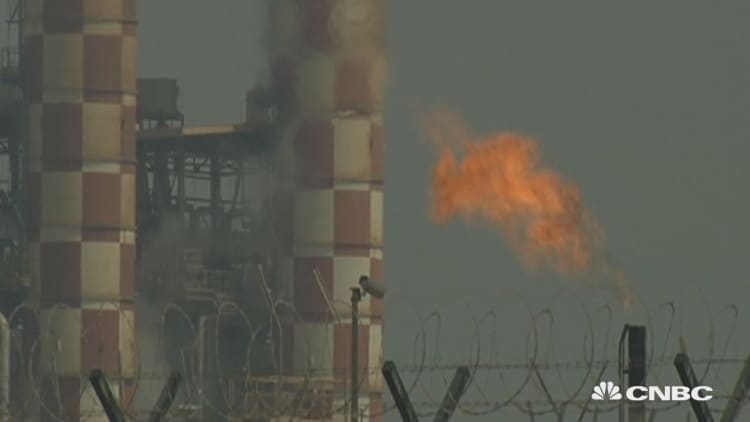
After the collapse of major oil producer talks this weekend, analysts are questioning whether diplomatic relations between Saudi Arabia and Iran are damaged for good.
Talks between OPEC and non-OPEC oil producers in Qatar on Sunday failed to produce any deal to freeze production to support oil prices. This was largely due to a clash between OPEC members Saudi Arabia and Iran over oil production levels.
Saudi Arabia, the de facto leader of the 13-member oil producing group, said it would not freeze output levels if Iran did not do the same. But Iran, which was absent from the talks, has repeatedly said it is unwilling to freeze production levels as it wants to regain the market share it lost during years of economic sanctions.
On a wider global level, oil prices have slumped since mid-2014 on the back of a glut in supply and the failure of demand to keep up.
The decline in prices has been partly attributed to Saudi Arabia, as it spear-headed OPEC's decision in late 2014 not to cut production, as part of a strategy to pressure rival oil producers such as those in the U.S.
Who's to blame?
Saudi Arabia has blamed Iran for the failure of Sunday's talks. However, Russia has defended Iran, saying that the Saudi demand for all countries to participate in a production freeze was "unreasonable."
Iran's OPEC representative said on Monday that "Those who suggested an oil output freeze wrongly thought that Iran had no option but to accept," according to Iran's Shana news agency,
Helima Croft, global head of commodity strategy at RBC Capital Markets, said Saudi Arabia's insistence on full Iranian participation proved the stumbling block.
"Saudi Arabia stood firm, despite the determined efforts of its key GCC allies, such as Qatar and Kuwait, which normally stand shoulder to shoulder with the Kingdom on oil policy, to forge an agreement to freeze output at January levels, irrespective of Iranian involvement," Croft said in a report on Monday.
Abhishek Deshpande, oil and gas analyst at Natixis, said Saudi Arabia was disingenuous in blaming Iran.
"Everybody was expecting Iran not to cut back and not to join the freeze, so surely the Saudis were quite aware of this," he told CNBC TV on Monday.
Implications for OPEC
The failure of the talks was somewhat expected, with many oil market analysts predicting in the run-up that political rivalry between the two Middle Eastern powerhouses would scupper any chance of compromise.
There is no love lost between the two nations, which are separated along religious, geopolitical and ideological lines.
Saudi Arabia is at the heart of Sunni Islam and ruled by an ultra-conservative monarchy, whereas Iran is an Islamic republic and the home of Shia Islam, a different strand of the religion vying for ideological dominance in the region.
Unlike Saudi, Iran has a history of fraught relations with the west and the lifting of some international sanctions linked to its nuclear program only occurred in January.
Proxy power struggles in neighboring countries, such as Yemen, are still in play and the Saudi execution of a popular Shi'ite cleric, Nimr al-Nimr, in January pushed diplomatic relations to a new low.
Against this background, oil analysts are watching the latest tension with interest and say it could have consequences for producer relations and the upcoming OPEC meeting on June 2.
"It suggests that any attempt to balance the market, should demand falter, will be tougher to engineer, while also leaving open the possibility that Saudi may choose to expand its production from its as yet untested spare capacity, dampening the price effect of any market tightening later this year and into 2017," Jon Rigby, oil analyst at UBS, said on Monday in a note.
Some OPEC members, like Nigeria, have said the next members' meeting could be opportunity to find a compromise, but RBC's Croft was uncertain over whether anything will be achieved.
"Unless Saudi Arabia or Iran has a change of heart, we fail to see how the outcome will be any different, and it may ultimately be mounting supply disruptions in stressed states, rather than collective cartel action, that causes an accelerated market rebalancing," she said.


